I was able to do it, below is my state machine, I took the sample project for running the batch job Manage a Batch Job (AWS Batch, Amazon SNS) and modified it for two lambdas for passing input/output.
{
"Comment": "An example of the Amazon States Language for notification on an AWS Batch job completion",
"StartAt": "Submit Batch Job",
"TimeoutSeconds": 3600,
"States": {
"Submit Batch Job": {
"Type": "Task",
"Resource": "arn:aws:states:::batch:submitJob.sync",
"Parameters": {
"JobName": "BatchJobNotification",
"JobQueue": "arn:aws:batch:us-east-1:1234567890:job-queue/BatchJobQueue-737ed10e7ca3bfd",
"JobDefinition": "arn:aws:batch:us-east-1:1234567890:job-definition/BatchJobDefinition-89c42b1f452ac67:1"
},
"Next": "Notify Success",
"Catch": [
{
"ErrorEquals": [
"States.ALL"
],
"Next": "Notify Failure"
}
]
},
"Notify Success": {
"Type": "Task",
"Resource": "arn:aws:lambda:us-east-1:1234567890:function:readcloudwatchlogs",
"Parameters": {
"LogStreamName.$": "$.Container.LogStreamName"
},
"ResultPath": "$.lambdaOutput",
"Next": "ConsumeLogs"
},
"ConsumeLogs": {
"Type": "Task",
"Resource": "arn:aws:lambda:us-east-1:1234567890:function:consumelogs",
"Parameters": {
"randomstring.$": "$.lambdaOutput.logs"
},
"End": true
},
"Notify Failure": {
"Type": "Task",
"Resource": "arn:aws:states:::sns:publish",
"Parameters": {
"Message": "Batch job submitted through Step Functions failed",
"TopicArn": "arn:aws:sns:us-east-1:1234567890:StepFunctionsSample-BatchJobManagement17968f39-e227-47ab-9a75-08a7dcc10c4c-SNSTopic-1GR29R8TUHQY8"
},
"End": true
}
}
}
The key to read logs was in the Submit Batch Job output which contains LogStreamName, that I passed to my lambda named function:readcloudwatchlogs and read the logs and then eventually passed the read logs to the next function named function:consumelogs. You can see in the attached screenshot consumelogs function printing the logs.
{
"Attempts": [
{
"Container": {
"ContainerInstanceArn": "arn:aws:ecs:us-east-1:1234567890:container-instance/BatchComputeEnvironment-4a1593ce223b3cf_Batch_7557555f-5606-31a9-86b9-83321eb3e413/6d11fdbfc9eb4f40b0d6b85c396bb243",
"ExitCode": 0,
"LogStreamName": "BatchJobDefinition-89c42b1f452ac67/default/2ad955bf59a8418893f53182f0d87b4b",
"NetworkInterfaces": [],
"TaskArn": "arn:aws:ecs:us-east-1:1234567890:task/BatchComputeEnvironment-4a1593ce223b3cf_Batch_7557555f-5606-31a9-86b9-83321eb3e413/2ad955bf59a8418893f53182f0d87b4b"
},
"StartedAt": 1611329367577,
"StatusReason": "Essential container in task exited",
"StoppedAt": 1611329367748
}
],
"Container": {
"Command": [
"echo",
"Hello world"
],
"ContainerInstanceArn": "arn:aws:ecs:us-east-1:1234567890:container-instance/BatchComputeEnvironment-4a1593ce223b3cf_Batch_7557555f-5606-31a9-86b9-83321eb3e413/6d11fdbfc9eb4f40b0d6b85c396bb243",
"Environment": [
{
"Name": "MANAGED_BY_AWS",
"Value": "STARTED_BY_STEP_FUNCTIONS"
}
],
"ExitCode": 0,
"Image": "137112412989.dkr.ecr.us-east-1.amazonaws.com/amazonlinux:latest",
"LogStreamName": "BatchJobDefinition-89c42b1f452ac67/default/2ad955bf59a8418893f53182f0d87b4b",
"TaskArn": "arn:aws:ecs:us-east-1:1234567890:task/BatchComputeEnvironment-4a1593ce223b3cf_Batch_7557555f-5606-31a9-86b9-83321eb3e413/2ad955bf59a8418893f53182f0d87b4b",
..
},
..
"Tags": {
"resourceArn": "arn:aws:batch:us-east-1:1234567890:job/d36ba07a-54f9-4acf-a4b8-3e5413ea5ffc"
}
}
import boto3
client = boto3.client('logs')
def lambda_handler(event, context):
print(event)
response = client.get_log_events(
logGroupName='/aws/batch/job',
logStreamName=event.get('LogStreamName')
)
log = {'logs': response['events'][0]['message']}
return log
import json
print('Loading function')
def lambda_handler(event, context):
print(event)



